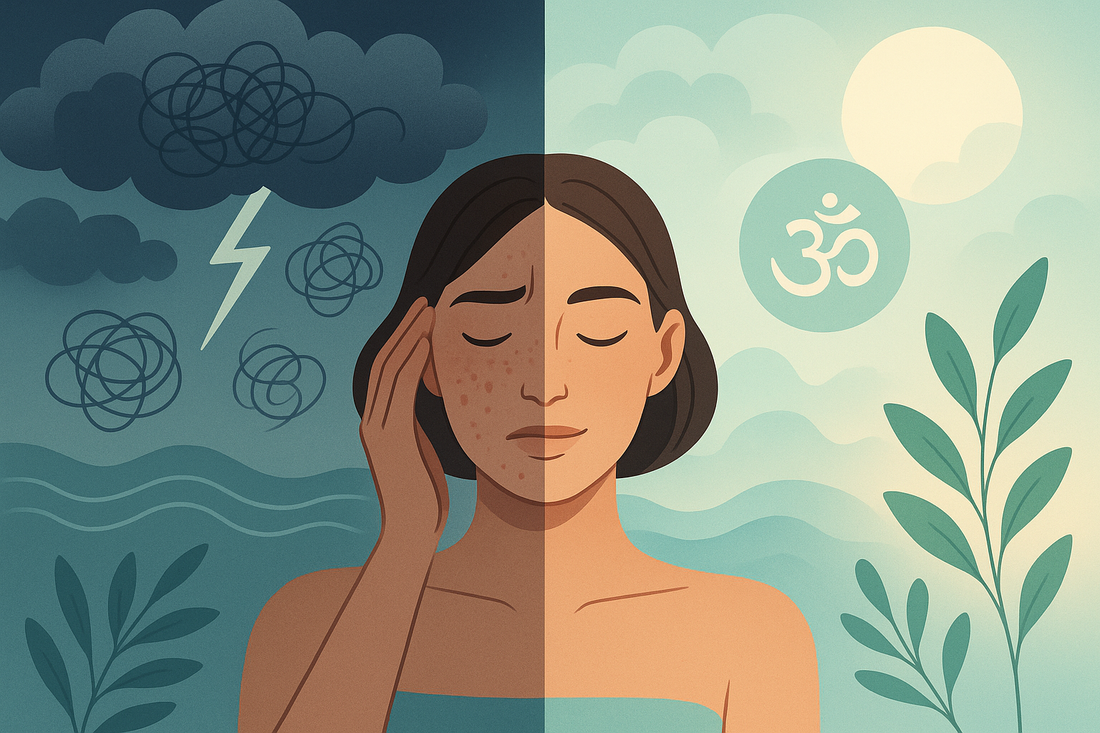
The Mind-Body Connection: How Stress Affects Skin Health
Share
In our fast-paced world, stress has become an almost ubiquitous part of daily life. While most people are aware of the mental and emotional toll stress can take, fewer realize its significant impact on physical health, particularly skin health. Understanding the intricate relationship between stress and skin is essential for those seeking holistic wellness. This article delves into the science behind how stress affects the skin, particularly through the hormone cortisol, and offers practical stress-relief techniques to promote healthier skin.
The Science of Stress and Skin Health
Cortisol: The Stress Hormone
When we encounter stress, our bodies release a hormone called cortisol. Often dubbed the “stress hormone,” cortisol prepares the body for a fight-or-flight response. While this mechanism is beneficial in short bursts, chronic stress can lead to sustained high levels of cortisol, which has several detrimental effects on the skin.
Cortisol and Inflammation
High cortisol levels can disrupt the skin’s natural balance, leading to inflammation. This inflammation manifests in various skin conditions, including eczema, psoriasis, and dermatitis. Inflammation weakens the skin’s barrier, making it more susceptible to irritants, allergens, and infections. Over time, chronic inflammation can accelerate the aging process, leading to premature wrinkles and a loss of skin elasticity .
Acne and Breakouts
Cortisol also triggers increased oil production in the skin’s sebaceous glands. Excessive oil can clog pores, leading to acne and breakouts. Stress-induced acne is often more severe and harder to treat due to the accompanying inflammation and slower skin healing rates .
Premature Aging
One of the most concerning effects of chronic stress is its contribution to premature aging. Cortisol breaks down collagen, the protein responsible for keeping skin firm and elastic. Reduced collagen levels lead to the formation of fine lines, wrinkles, and sagging skin. Additionally, stress can reduce the skin’s ability to repair itself, exacerbating the aging process .
Stress-Relief Techniques for Healthier Skin
Reducing stress is crucial for maintaining skin health. Here are some effective stress-relief techniques that can help promote a clearer, more youthful complexion:
Meditation
Meditation is a powerful tool for reducing stress. It involves focusing the mind and eliminating distractions, which can help lower cortisol levels. Studies have shown that regular meditation can reduce stress-related inflammation and improve skin conditions such as psoriasis and eczema . Beginners can start with guided meditations or simple breathing exercises for a few minutes each day.
Yoga
Yoga combines physical postures, breathing exercises, and meditation to reduce stress and promote overall well-being. The physical aspect of yoga increases blood circulation, which can help nourish the skin and remove toxins. The mindfulness component helps calm the mind, reducing cortisol levels and the associated negative effects on the skin .
Deep Breathing Exercises
Deep breathing exercises are an easy and effective way to manage stress. By focusing on slow, deep breaths, you can activate the body’s relaxation response, reducing cortisol levels. This practice can be done anywhere and at any time, making it an accessible tool for immediate stress relief .
Regular Exercise
Exercise is a well-known stress reducer that also benefits the skin. Physical activity increases blood flow, which helps deliver oxygen and nutrients to the skin. It also promotes sweating, which can help clear pores of toxins and impurities. Additionally, exercise reduces cortisol levels and boosts endorphin production, improving mood and reducing stress-related skin issues .
The mind-body connection plays a crucial role in skin health. By understanding how stress affects the skin through mechanisms like cortisol-induced inflammation, acne, and premature aging, we can take proactive steps to manage stress. Incorporating stress-relief techniques such as meditation, yoga, and deep breathing exercises into daily routines can significantly improve skin health, leading to a clearer, more radiant complexion. Remember, healthy skin starts from within, and managing stress is a key component of any effective skincare regimen.
